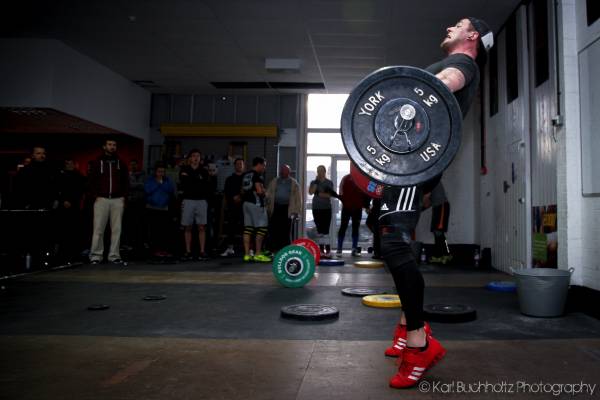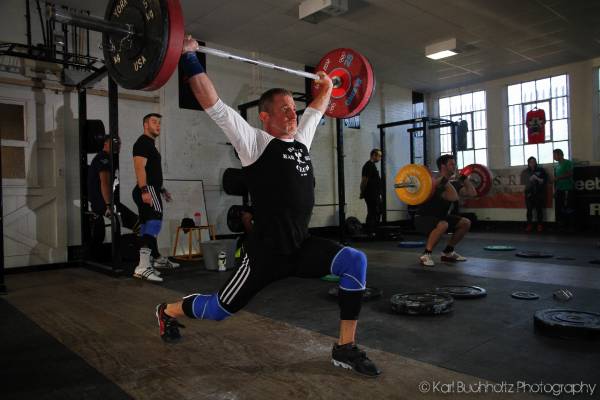Having been a lifelong follower of American weightlifting, I think I can safely say that interest in the sport is currently at an all-time high. Due to the years of efforts by factions within the NSCA and strength and conditioning communities, and the relatively recent rediscovery of the snatch and clean and jerk as exercise modalities by CrossFit, weightlifting has a higher profile and following than at any time I’ve been involved.
Even within the weightlifting community only a portion of that group had come to the conclusion that the actual performance of the lifts was addictive. Those of us within the pro-addiction faction have known for years that if more people were introduced to the proper performance of the lifts, they would become addicts and strong advocates. Thanks largely to CrossFit and to some other players, I believe there has developed a strong enough support of weightlifting for it to remain as a permanent part of the physical culture community of this country.
And even though it is currently on an upswing, and there might well come a time that there will be some waning of interest and a slowing of growth, it looks as though there will always be a strong core of athletes and enthusiasts eager to practice the snatch and clean and jerk. Subsequently there will continue to be a need for competent instruction and coaching. This might be an appropriate time to muse about the future of coaching education.
Teaching, Pedagogy, and American Culture
Having been a secondary science teacher for forty years, I feel well qualified to speak on this topic before I move forward with the main thrust of this article. America as a culture does not respect the teaching profession to the extent of other societies. While teachers are always lamenting their underpaid status, we need to realize that other societies also underpay their teachers, but they do grant them much higher social esteem. This cultural value of esteem for teachers enables education to take place more effectively in many countries. The esteem that children and parents hold for their teachers minimizes the amount of effort that a teacher must expend on classroom discipline.
Consequently, as a society we are not too concerned with the concept of pedagogy, the art and science of teaching. While many teacher education programs abound, too much time and effort is given over to teaching legalistic and administrative priorities, social engineering standards, fighting ghosts of the past, and pedagogical theory. Most successful teachers will probably confess that the best practices were learned after they were hired and began consorting with other skilled practitioners.
By the way, the teachers that rise above the inadequacies of the system are the ones with a firm conviction in the importance of their mission and a need to make it comprehensible to their students.

What This Has to Do With Coaching Weightlifting
Here are some of the current methods of weightlifting instruction and my thoughts on each:
1. Single-Day or Weekend Courses
These courses are quite popular now and have been in use for years by various organizations. Weightlifting courses were first introduced in the 1980s by USA Weightlifting as a means of introducing new coaches to proper procedures for coaching and training new weightlifters. These were taught by a number of veteran coaches. For the most part, they served their intended purpose with many of today’s more accomplished coaches having started with those courses.
As a medium, weekend seminars can be quite effective provided that they are targeted toward the proper audience. Lumping a heterogeneous group of coaches functioning at a variety of levels will leave all of them somewhat unfulfilled. To be most effective, these courses should be targeted specifically at beginning, intermediate, or advanced coaches. There should be some course materials provided beforehand, and there should be some thought given as to follow-up activities that will reinforce the concepts introduced at the course. There should be well-designed hands-on sessions as a part of the curriculum.
For all courses, regardless of level, the presenters need to focus some attention on the slides and videos presented. They should be engaging and convey a digestible amount of content. Presently, I am a subscriber to a website called Slideshare that regularly offers tips on effective slide presentation and displays members’ sample contributions of exceptional slide presentation. In the future I plan on taking a course from Edward Tufte, the premier designer for information presentation design.
2. Online Courses
I don’t believe that all aspects of coaching education lend themselves particularly well to online instruction, although there is an assumption that coaches can be at least adequately educated through this medium. I find that the theoretical underpinnings can best be conveyed through online. Subjects such as biomechanics, applied physiology, nutrition, psychology, and program planning can be adequately covered and when accompanied with appropriate exercises can make distance learning especially effective. Of course, this all depends on the quality of the pedagogical capacity of the instructor.
So much of coaching, however, is dependent upon evaluating conditions as they evolve in real time, and thus for those situations online isn’t nearly as effective as prolonged periods of job shadowing and coaching in the gym.

3. Internships
The most effective way to develop the skills and instincts for coaching is through an internship whereupon the intern is taken under the tutelage of a master coach, and assigned various tasks and opportunities that educate in a manner that no course, seminar, or online learning can. In addition to the chance of job shadowing a top coach, an intern is given the opportunity to take responsibility for the development of one or more beginning lifters while under expert oversight. A developing coach coming out of this type of experience is prepared to begin coaching developing lifters while staying in communication with his or her mentor. An ideal situation.
I am currently in the process of developing such a program. The entire program is being well planned and thought out with the goal of providing the intern with an educational experience unmatched anywhere else. There will be an admission procedure to insure that the intern is literate in both relevant science and sports coaching. A prospective candidate will be able to provide an official transcript listing the successful completion of prescribed science courses or pass a diagnostic exam that is currently being prepared. There will be an interview process to determine leadership qualities and references will be accepted. A minimum number of hours of gym time will be required. One or two lifters or even a small developmental group will be assigned, and the results of their progress will be part of the evaluation. There will be an exit exam about programming principles.
I’ve included some of the details about my proposed plans so that readers can understand that to be effective an internship must be planned, organized, and goal oriented. It’s got to be more than, “Follow me around, dude!” While none of the current crop of top U.S. coaches, myself included, ever went through a formal internship, I believe this is the best way for new coaches to most quickly and effectively begin to learn the science and art of coaching.
Photos courtesy of Karl Buchholtz Photography.






